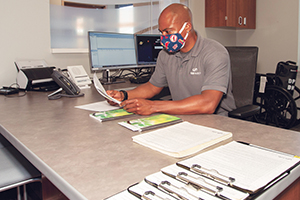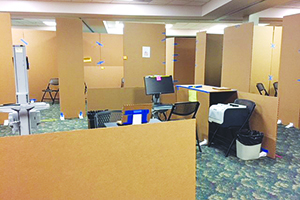Centers provide ready access to care, referrals
By JULIE MINDA
Nearly 60 percent of U.S. adults with a mental illness have not received treatment for their conditions. And nearly a quarter of adults with mental illness reported that they have been unable to receive the treatment they sought. This is according to a 2020 report on mental health care access from the nonprofit Mental Health America.

Chris Outlaw, a mental health technician with SSM Health, reviews patient registration information at SSM Health Behavioral Health Urgent Care in suburban St. Louis.
The organization's analysis said the cost of services and the lack of availability of appropriate services were barriers to access.
Facilities within SSM Health and Providence St. Joseph Health are among a small number of U.S. health care providers aiming to address such problems by offering immediate access to treatment for acute mental health issues, and referrals to community providers for longer-term mental health care.
SSM Health Behavioral Health Urgent Care opened at the end of August on the campus of SSM Health DePaul Hospital – St. Louis. Providence Behavioral Health Urgent Care — Everett opened about a year ago on the campus of Providence Regional Medical Center Everett in Everett, Washington.
"We are working with community partners to provide a wellness path for ongoing care, we're helping clients avoid a mental health crisis and we're helping them avoid going to the emergency department for mental health conditions," said Michelle Schafer, SSM Health regional vice president of behavioral health. "We're also meant to be a model that can be replicated elsewhere."

Schafer
The urgent care approach "solves for a lot of gaps. The dream is to create a behavioral health continuum" of care, said Laura Knapp, director of behavioral health for Providence's northwest region.
Care now
Both the SSM Health and the Providence behavioral health urgent care centers allow walk-ins, including right from the emergency department of the adjacent hospitals, as well as scheduled appointments. In many cases, patients can access services virtually, a draw for those who are taking pains to avoid public places during the pandemic.
Typical conditions seen in both centers include substance use disorders, depression, mood disturbances, anxiety, stress, grief reactions and psychosis.
The SSM Health center's staff includes a nurse, a master's prepared clinical therapist, a nurse practitioner, a nurse manager and a community health worker. A psychiatrist is the center's medical director. The center also has access to other psychiatrists and clinicians on staff at SSM Health DePaul Hospital.
The Providence center's staff comprises a medical director who is a psychiatrist, two psychiatric nurse practitioners, a clinical social worker trained and licensed in behavioral health, a substance abuse expert, a peer counselor and a receptionist.

Before committing to a floor plan, SSM Health set up this full-scale cardboard model of its behavioral health urgent care center in a church banquet hall. Potential patients and mental health clinicians were among those giving input about the layout.
When a new patient arrives at the SSM Health urgent care facility, a nurse does a first assessment to assure any pressing medical needs are addressed, then the therapist conducts a mental health history and assessment to understand the person's needs. That therapist also can initiate basic therapy for acute symptoms of mental illness.
The nurse practitioners can prescribe psychiatric medications. The team members will then refer the client to SSM Health sites or partner community organizations that can provide long-term mental health care and social services. Those providers have commited to schedule appointments within three days.
When a patient arrives at the Providence behavioral health urgent care clinic, it's the peer counselor who performs a triage interview using a screening tool. The patient provides some medical history and describes the reason they are seeking care. The peer counselor presents the reason for the client's visit to the multidisciplinary team. That team decides who will see the patient first. The patient may see multiple team members during the visit.
The patient can get immediate therapy for the acute symptoms, a prescription for psychiatric medications and assistance with accessing social services.

Knapp
In both behavioral urgent care centers, staff locate a community mental health provider that would meet the longer-term needs of the patient and schedule any appointments to ensure a smooth handoff with that next organization.
SSM Health's Schafer and Providence's Knapp said the main role of their respective facilities is stabilizing patients until that handoff occurs and helping them find the resources they need in the community. They said community partnerships are essential to the success of this approach.
Strength in partnership
Schafer said the SSM Health center is the result of two-plus years of planning. The effort began after the St. Louis Regional Health Commission convened a group of mental health care providers including SSM Health as well as representatives of law enforcement, the judicial system and other groups with a stake in community mental health to study the problem of unmet mental health care needs regionally.
In St. Louis over the last decade, there has been an increase of more than 40 percent in people visiting emergency rooms seeking treatment for mental health issues. That is according to the St. Louis Regional Mental Health Data Report. Schafer said people often seek mental health care in emergency departments because they cannot find the services they need in the community or they are unable to get an appointment quickly.
SSM Health developed the concept for the urgent care center drawing on learnings from the commission's work, insights from partners on the commission and other research. Schafer noted that the concept is so new that the planning team had very few examples to study — she's aware of fewer than a dozen behavioral health urgent care centers in the U.S.
Schafer said the urgent care center is a collaborative effort of SSM Health and other mental health provider organizations in the region. SSM Health is the region's largest provider of mental health care, with a continuum of services, including 400 inpatient psychiatric beds spread out across several campuses in the greater St. Louis area.
Knapp said that the Western Washington region has many innovative facilities operated by Providence and other community partners. These sites are dedicated to assisting people with mental health and related needs. Partner facilities include a county run diversion center that is a short-term shelter for homeless individuals with substance abuse or other behavioral health issues, community mental health centers and a crisis triage and stabilization center.
Despite the fact that these services are available in the area, multiple assessments in Everett have shown that there was not enough capacity to meet all acute mental health needs. Knapp noted that because many people cannot get the help they need when they need it, they often turn to the emergency room. The Providence Regional Medical emergency center sees 1,200 people per month who have behavioral health needs as their primary or secondary diagnosis.
A mental health committee that Providence Everett medical center assembled determined that a behavioral health urgent care was the best approach to address the community needs.
Providence has a behavioral health urgent care in Missoula, Montana, as well.
Piece of the puzzle
Dr. Arpan Waghray, co-chair of the Providence St. Joseph Health Behavioral Medicine Clinical Practice Group and the medical director for Well Being Trust, said Providence is developing "a comprehensive approach to improve mental health and substance use care across all our EDs with an upstream focus. We are looking at behavioral health urgent care and bridge clinics as part of a larger solution based on specific regional needs and assessments." Waghray said Providence is considering converting its adult clinics in its Portland, Oregon, service area into behavioral health urgent care centers.
Knapp said the Everett center's services are especially essential now as shutdowns related to the pandemic are isolating people and in many cases increasing their economic instability, and these pressures can increase people's risk of mental illness.
"With the risk factors COVID created, we're not surprised to see what the data (based on the center's medical records) is showing — substance abuse is up, stress is up, anxiety is up, depression is up.
"We are trying to create a seamless system of care to help," she said.